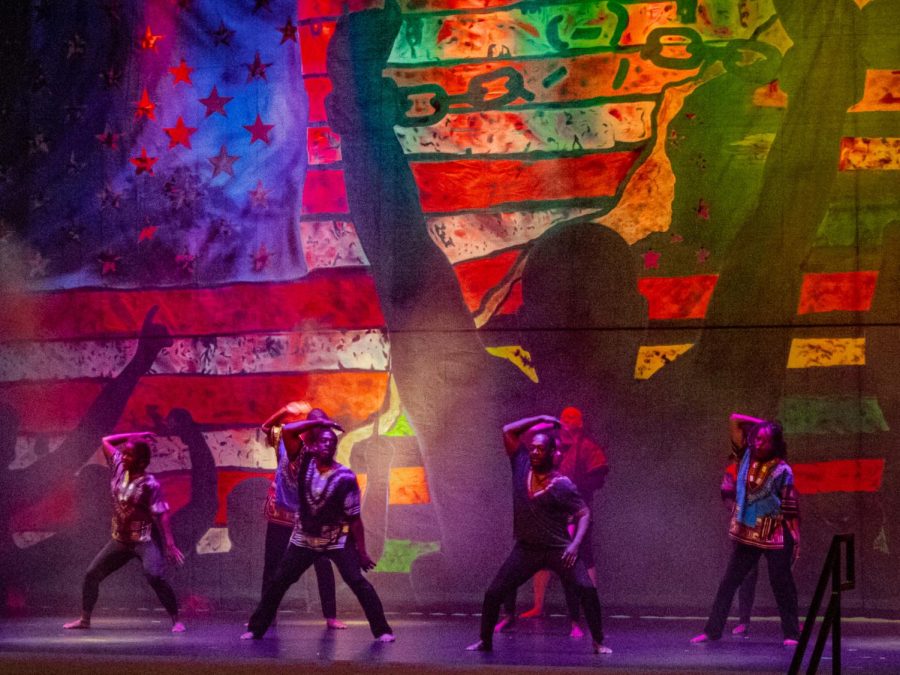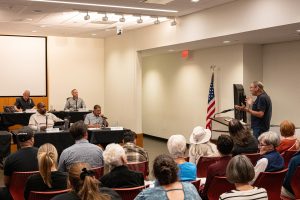‘1619: The Journey of a People’ musical held at the Egyptian Theatre
The cast of the musical “1619: The Journey of a People,” performing on stage on Oct. 20 at the Egyptian Theatre. (Nyla Owens | Northern Star)
October 24, 2022
Thursday night at the Egyptian Theatre, there was a performance of the musical “1619: The Journey of a People,” which helped the audience learn about the experience of African American people throughout America’s history.
The musical is based on a project by Nikole Hannah-Jones of the same name, the “1619 Project.” This project details the progression of anti-blackness in America starting in the year 1619, the year the first group of enslaved African people were brought to America.
The musical chronicled the experience of people of the African diaspora in America.
Cut into two parts with a Q&A scheduled afterward, the show was prepped not only for entertainment but for history, bridge-building and education as well.
Before the show started, the theater was full of laughter, welcomes and hellos. The regular crowd of Egyptian Theatre events was there, greeted by the staff, but there were also many audience members who attended the theater for the first time.
“This is my first time at the Egyptian Theatre,” said Laverne Renee Triplett, a DeKalb resident. “This was an opportunity to kill two birds with one stone, in a sense, to get to see the theater and to get to see the history.”
After thanking the sponsors, NIU and all who gave to the needs-drive for New Hope Food Pantry and Huskie Food Pantry, the show began.
Some of the first songs of the musical, “Captured” and “Slave for Life,” were signs of what was to come. The songs were rallying cries to the audience, showing whipping and slave-catching on stage, yet the songs managed to be entirely objective.
If these songs lacked taste and class, they would have been shocking and may have turned people off to the show. Instead, the cast was able to make the audience understand the plight of enslaved people.
“I learned a lot about our past, African American leaders and just a little more information about the things we’ve gone through as a nation,” said Carmone Branigan, a first-year sociology major.
The first half touched on key moments of the African American experience. Black icons such as W.E.B. Du Bois, Booker T. Washington and Frederick Douglass were referenced.
For those who weren’t aware of these figures before the show, the audience learned about them through an entertaining and compelling story, with the possibility for historical learning and educational growth for those who are willing to learn their stories in their free time.
This is not to say that the cast did a poor job of telling the story of American history. Rather, the show seemed to emphasize the lack of education that Americans receive about this part of American history.
As the curtain fell for intermission, the song “Trying” came to a close. “Trying” is a song about the struggles for freedom that African Americans face. The song argues that though progress has been made, there is not equity among all Americans. The song ends by repeating, “I’m still trying,” a cry to the audience to keep fighting for change.
As the crowd emptied from the theater for intermission, there was a pack of students sitting together, enjoying themselves.
Part of that pack are Aidan Marshall, a junior mechanical engineering major, and Jack Janik, a junior finance major, both members of Phi Sigma Kappa. During intermission, they shared their thoughts about the show.
“I think it’s been awesome,” Marshall said.
“It’s gotten my noggin’ joggin’ that’s for sure,” Janik said.
When the second half started it was clear from its first quotes to the constant reference to his name, speeches and ideas, that the focus of the play was going to shift: Martin Luther King Jr.
The half spanned the jazz age of the ‘20s up to the Black Lives Matter protests of the previous five years. Finally, a question was yelled to the audience: “What would MLK say about these Divided States of America today?”
The Q&A started right after the final curtain came down.
Ted Williams III, the producer, playwright and performer playing Dexter, the symbol of Black excellence in the musical, said that this was the hardest show he has had to play in the years of touring this piece. Williams woke up Thursday morning with no voice, but by not talking all day he was able to make it through the show, albeit with a noticeable rasp in his voice.
Ozivell Ecford performed the role of Benjamin and played the djembe drum on stage throughout the night.
“My hope for the show is that people come see the show and that when they leave they have the necessary important conversations to keep the messages of this show alive,” Ecford said. “I hope that people are kinder to each other and that they tell their stories.”







